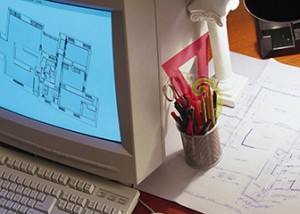Mechanical engineers plan and design tools, engines, machines, and other mechanical systems that produce, transmit, or use power. They may work in design, instrumentation, testing, robotics, transportation, or bioengineering, among other areas. The broadest of all engineering disciplines, mechanical engineering extends across many interdependent specialties. Mechanical engineers may work in production operations, maintenance, or technical sales, and many are administrators or managers. There are approximately 226,000 mechanical engineers employed in the United States.
The modern field of mechanical engineering took root during the Renaissance. In this period, engineers focused their energies on developing more efficient ways to perform such ordinary tasks as grinding grain and pumping water. Water wheels and windmills were common energy producers at that time. Leonardo da Vinci, who attempted to design such complex machines as a submarine and a helicopter, best personified the burgeoning mechanical inventiveness of the period. One of the Renaissance’s most significant inventions was the mechanical clock, powered first by falling weights and later by compressed springs.
Despite these developments, it was not until the Industrial Revolution that mechanical engineering took on its modern form. The steam engine, an efficient power producer, was introduced in 1712 by Thomas Newcomen to pump water from English mines. More than a half century later, James Watt modified Newcomen’s engine to power industrial machines. In 1876, a German, Nicolaus Otto, developed the internal combustion engine, which became one of the century’s most important inventions. In 1847, a group of British engineers who specialized in steam engines and machine tools, organized the Institution of Mechanical Engineers. The American Society of Mechanical Engineers was founded in 1880.
Mechanical engineering rapidly expanded in the 20th century. Mass production systems allowed large quantities of standardized goods to be made at a low cost, and mechanical engineers played a pivotal role in the design of these systems. In the second half of the 20th century, computers revolutionized production. Mechanical engineers now design mechanical systems on computers, and they are used to test, monitor, and analyze mechanical systems and factory production. Mechanical engineers are key players in countless industries, including the aviation and aerospace industries.
Mechanical Engineer Job Description
 The work of a mechanical engineer begins with research and development. A private aerospace company, for example, may need to develop a more fuel-efficient aircraft engine, or engineers employed by the National Aeronautics and Space Administration (NASA) may be asked to create a cooling and heating system for the crew exploration vehicle, which will replace the space shuttle. A mechanical engineer working in the research department explores the project’s theoretical, mechanical, and material challenges. The engineer may perform experiments to gather necessary data and acquire new knowledge. Often, an experimental device, such as a flight demonstrator, or system is developed. A mechanical engineer may be assigned to oversee the design, development, and testing of the flight demonstrator, which will test and validate various technologies during orbital flight, reentry, and landing of the crew exploration vehicle or other vehicles or technologies.
The work of a mechanical engineer begins with research and development. A private aerospace company, for example, may need to develop a more fuel-efficient aircraft engine, or engineers employed by the National Aeronautics and Space Administration (NASA) may be asked to create a cooling and heating system for the crew exploration vehicle, which will replace the space shuttle. A mechanical engineer working in the research department explores the project’s theoretical, mechanical, and material challenges. The engineer may perform experiments to gather necessary data and acquire new knowledge. Often, an experimental device, such as a flight demonstrator, or system is developed. A mechanical engineer may be assigned to oversee the design, development, and testing of the flight demonstrator, which will test and validate various technologies during orbital flight, reentry, and landing of the crew exploration vehicle or other vehicles or technologies.
The design engineer takes information gained from research and development and uses it to plan commercially useful products, for example, photonic systems. The aircraft industry uses such systems of lasers for gyroscopic compasses; military uses include systems for avionic platforms, navigation, defense, and search and rescue missions. After the product has been designed and a prototype developed, the product is analyzed by testing engineers. Engineers working for the military, for example, could fine-tune a “photon pistol” capable of shooting the secret code to launch defense missiles. Design and testing engineers continue to work together until the “photon pistol” could send its particles of light accurately and to some distance along fiber optic cables. Once the final design is set, it is the job of the manufacturing engineer to come up with the most time- and cost-efficient way of making the product without sacrificing quality. The amount of factory floor space, the type of manufacturing equipment and machinery, and the cost of labor and materials are some of the factors that must be considered. Engineers select the necessary equipment and machines and oversee their arrangement and safe operation. Mechanical engineers often need to work closely with other specialists such as chemical, avionics, electrical, and industrial engineers to finish the project.
Some types of mechanical systems, such as a telescope used for space and planetary exploration, are so sophisticated that mechanical engineers are needed for operation and ongoing maintenance. For example, numerous mechanical engineers are assigned to monitor, repair, and improve delicate components such as detector mounts and shutter mechanisms on NASA’s Hubble Space Telescope. With the help of computers, maintenance and operations engineers use their specialized knowledge to monitor complex production systems and make necessary adjustments.
Mechanical engineers also work in marketing, sales, and administration. Because of their training in mechanical engineering, sales engineers can give customers a detailed explanation of how a machine or system works. They may also be able to alter its design to meet a customer’s needs.
In a small company, a mechanical engineer may need to perform many, if not most, of the above responsibilities. Some tasks might be assigned to consulting engineers, who are either self-employed or work for a consulting firm. At large government organizations, a mechanical engineer may just focus on one of the above responsibilities.
Other mechanical engineers may work in a number of specialized areas. Energy specialists work with power production machines to supply clean and efficient energy for space and aircrafts. Application engineers specialize in computer-aided design systems. Structural analysts may monitor the static, fatigue, and stress damage to mechanical systems of military aircraft or spacecraft.
Mechanical Engineer Career Requirements
 High School
High School
If you are interested in mechanical engineering as a career, you need to take courses in geometry, trigonometry, and calculus. Physics and chemistry courses are also recommended, as is mechanical drawing or computer-aided design, if they are offered at your high school. Communication skills are important for mechanical engineers because they interact with a variety of coworkers and vendors and are often required to prepare and/or present reports. English and speech classes are also helpful. Finally, because computers are such an important part of engineering, computer science courses are good choices.
Postsecondary Training
A bachelor’s degree in mechanical engineering is usually the minimum educational requirement for entering this field. A master’s degree, or even a Ph.D., may be necessary to obtain some positions, such as those in research, teaching, and administration.
In the United States there are more than 280 colleges and universities where the Accreditation Board has approved mechanical engineering programs for Engineering and Technology. Although admissions requirements vary slightly from school to school, most require a solid background in mathematics and science.
In a four-year undergraduate program, students typically begin by studying mathematics and science subjects, such as calculus, differential equations, physics, and chemistry. Course work in liberal arts and elementary mechanical engineering is also taken. By the third year, students begin to study the technical core subjects of mechanical engineering—mechanics, thermodynamics, fluid mechanics, design manufacturing, and heat transfer—as well as such specialized topics as power generation and transmission, computer-aided design systems, and the properties of materials.
At some schools, a five- or six-year program combines classroom study with practical experience working for an engineering firm or a government agency such as NASA.
Although these cooperative, or work-study, programs take longer, they offer significant advantages. Not only does the salary help pay for educational expenses, but the student has the opportunity to apply theoretical knowledge to actual work problems in mechanical engineering. In some cases, the company or government agency may offer full-time employment to its co-op workers after graduation.
A graduate degree is a prerequisite for becoming a university professor or researcher. It may also lead to a higher-level job within an engineering department or firm. Some companies encourage their employees to pursue graduate education by offering tuition-reimbursement programs. Because technology is rapidly developing, mechanical engineers need to continue their education, formally or informally, throughout their careers. Conferences, seminars, and professional journals serve to educate engineers about developments in the field.
Certification or Licensing
Engineers whose work may affect the life, health, or safety of the public must be registered according to regulations in all 50 states and the District of Columbia. Applicants for registration must have received a degree from an accredited engineering program and have four years of experience. They must also pass a written examination.
Many mechanical engineers also become certified. Certification is a status granted by a technical or professional organization for the purpose of recognizing and documenting an individual’s abilities in a specific engineering field. For example, the Society of Manufacturing Engineers offers the following designations to mechanical engineers who work in manufacturing and who meet education and experience requirements: certified manufacturing engineer and certified engineer manager.
Other Requirements
Personal qualities essential for mechanical engineers include the ability to think analytically, to solve problems, and to work with abstract ideas. Attention to detail is also important, as are good oral and written communication skills and the ability to work well in groups. Computer literacy is essential.
Exploring Mechanical Engineer Career
 One of the best ways to learn about the field is to talk with a mechanical engineer. Public libraries usually have books on mechanical engineering that might be enlightening. You might tackle a design or building project to test your aptitude for the field. Finally, some high schools offer engineering clubs or organizations.
One of the best ways to learn about the field is to talk with a mechanical engineer. Public libraries usually have books on mechanical engineering that might be enlightening. You might tackle a design or building project to test your aptitude for the field. Finally, some high schools offer engineering clubs or organizations.
Employers
Approximately 226,000 mechanical engineers are employed in the United States. They work for private engineering and aerospace companies and government entities such as NASA and the U.S. Department of Defense. Mechanical engineers also work in a variety of other settings, including manufacturers of industrial and office machinery, farm equipment, automobiles, petroleum, pharmaceuticals, fabricated metal products, pulp and paper, electronics, utilities, computers, soap and cosmetics, and heating, ventilating, and air-conditioning systems all employ mechanical engineers. Others are self-employed or work for colleges and universities.
Starting Out
Many mechanical engineers find their first job through their college or university career services office. Many companies send recruiters to college campuses to interview and sign up engineering graduates. Other students might find a position in the company where they had a summer or part-time job. Newspapers and professional journals often list job openings for engineers.
Advancement
As engineers gain experience, they can advance to jobs with a wider scope of responsibility and higher pay. Some of these higher-level jobs include technical service and development officers, team leaders, research directors, and managers. Some mechanical engineers use their technical knowledge in sales and marketing positions, while others form their own engineering business or consulting firm.
Many engineers advance by furthering their education. A master’s degree in business administration, in addition to an engineering degree, is sometimes helpful in obtaining an administrative position. A master’s or doctoral degree in an engineering specialty may also lead to executive work. In addition, those with graduate degrees often have the option of research or teaching positions.
Earnings
The National Association of Colleges and Employers reports the following 2005 starting salaries for mechanical engineers by educational achievement: bachelor’s degree, $50,236; master’s degree, $59,880; and Ph.D., $68,299. The U.S. Department of Labor reports that mechanical engineers had median annual salaries of $67,590 in 2005. Salaries ranged from less than $44,550 to $101,660 or more in 2005.
Like most professionals, mechanical engineers who work for a company or for a government agency usually receive a generous benefits package, including vacation days, sick leave, health and life insurance, and a savings and pension program. Self-employed mechanical engineers must provide their own benefits.
Work Environment
The working conditions of mechanical engineers vary. Most mechanical engineers work indoors in offices, research laboratories, or production departments of factories and shops. Depending on the job, however, a significant amount of work time may be spent on a noisy factory floor, at a construction site, or at another field operation. Mechanical engineers have traditionally designed systems on drafting boards, but since the introduction of sophisticated software programs, design is increasingly done on computers.
Engineering is for the most part a cooperative effort. While the specific duties of an engineer may require independent work, each project is typically the job of an engineering team. Such a team might include other engineers, engineering technicians, and engineering technologists.
Mechanical engineers generally have a 40-hour workweek; however, their working hours are often dictated by project deadlines. They may work long hours to meet a deadline, or show up on a second or third shift to check production at a factory or a construction project.
Mechanical engineering can be a very satisfying occupation. Engineers often get the pleasure of seeing their designs or modifications put into actual, tangible form, such as a satellite system or a new type of spacecraft. Conversely, it can be frustrating when a project is stalled, full of errors, or even abandoned completely.
Mechanical Engineer Career Outlook
The employment of mechanical engineers is expected to grow about as fast as the average for all occupations through 2014, according to the U.S. Department of Labor (USDL). Although overall employment in manufacturing is expected to decline, engineers will be needed to meet the demand for more efficient industrial machinery and machine tools. The USDL predicts good opportunities for mechanical engineers who are involved with new technologies such as biotechnology, nanotechnology, and materials science. It should also be noted that increases in defense spending in the wake of the terrorist attacks of September 11, 2001, might create improved employment opportunities for engineers within the federal government.
For More Information:
- Computer Science Careers
- Accreditation Board for Engineering and Technology
- American Society of Mechanical Engineers
- Society of Manufacturing Engineers